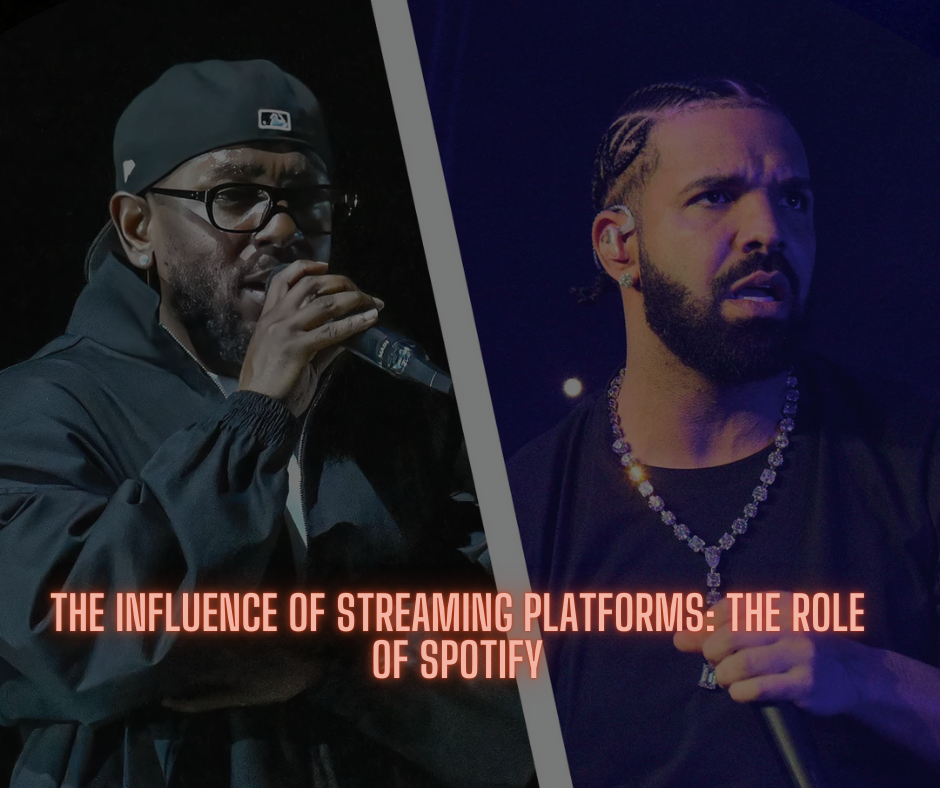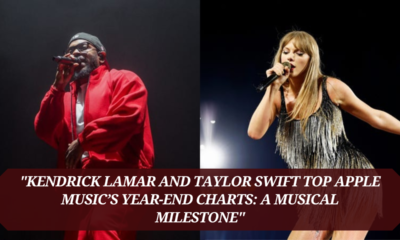Entertainment
Drake Claims UMG & Spotify Are Inflating Kendrick Lamar’s ‘Not Like Us’
Published
2 weeks agoon
By
divya
In the ever-evolving world of the music industry, where chart-topping hits and streaming numbers play a crucial role in defining an artist’s success, the pressure to stay relevant and dominate the charts is immense. Recently, hip-hop mogul Drake made headlines with a bombshell accusation, claiming that Universal Music Group (UMG) and Spotify were engaged in a scheme to “artificially inflate” the streaming performance of Kendrick Lamar’s track, Not Like Us. The accusation has sparked a firestorm of discussion among fans, music industry insiders, and artists alike. Drake’s comments have called into question the integrity of music streaming platforms and the role they play in chart rankings. This article dives deep into the details of Drake’s accusation, the potential implications for the music industry, and the ongoing tension between two of hip-hop’s biggest stars.
The Allegations: What Did Drake Say?
Drake’s accusations were made public through a combination of social media posts, leaked private messages, and an interview. The rapper, who has long been a prominent figure in the music scene, did not mince words when addressing the issue. He alleged that UMG and Spotify were conspiring to boost Kendrick Lamar’s new track, Not Like Us, through methods that he deemed unethical and manipulative.
In an Instagram post that quickly went viral, Drake claimed that streaming services were rigging the system to ensure Kendrick’s song appeared more popular than it was. He pointed to an unusual spike in streams and chart positions, which he suggested was not the result of organic fan engagement but rather a concerted effort by major players in the music industry to manipulate numbers.
Drake’s accusations didn’t stop at just the track’s performance on streaming platforms. He also suggested that UMG, one of the largest music labels in the world, was using its influence to ensure that Kendrick Lamar’s Not Like Us received more radio airplay, playlist placements, and promotional pushes compared to other tracks from Drake’s peers. Drake argued that this created an unfair advantage for Lamar, one that did not reflect the song’s actual popularity or demand.

The Stakes in the Music Industry
To understand the weight of Drake’s accusations, it’s essential to look at the way the music industry operates. In today’s world, streaming platforms like Spotify have become the dominant force in determining a song’s success. The number of streams a song accumulates can significantly influence its chart position, with platforms like Spotify even creating curated playlists that help elevate certain songs to a broader audience.
Chart performance, however, is not just about how many streams a song gets. There’s also a larger economic aspect at play. Being at the top of the charts brings in more revenue, greater visibility, and lucrative performance opportunities. For artists, a high-charting song can lead to increased album sales, endorsements, and international tours. For record labels, it means more royalties and more influence in the industry.
In this context, the power of record labels and streaming platforms cannot be overstated. UMG, for example, is one of the most powerful music labels globally, representing some of the biggest names in music. Spotify, the world’s largest streaming service, holds significant sway over how music is distributed and consumed. Together, these entities have the potential to shape the careers of artists, both big and small. Therefore, any manipulation of chart rankings or streaming numbers is a serious issue, as it can distort the true landscape of popular music.

Why Kendrick Lamar?
Kendrick Lamar is one of the most respected and influential artists of his generation. His ability to blend social commentary with innovative music has earned him numerous accolades, including a Pulitzer Prize for Music. Not Like Us is a track that many believe has the potential to be a major hit. However, Drake’s accusations bring up a critical question: Why would UMG and Spotify focus on Kendrick Lamar, particularly in this instance?
One explanation could be the longstanding rivalry between Drake and Lamar. Though both artists have expressed mutual respect for one another, there’s no denying that the two are often seen as being in competition for dominance in the rap game. Over the years, fans have pitted them against each other in “Drake vs. Kendrick” debates, with each artist having their own set of loyal followers. Kendrick is known for his thought-provoking lyricism, while Drake has cultivated a massive fanbase through his versatility and hit-making abilities. The dynamics between these two artists are as much about their musical styles as they are about their brand power.
If UMG and Spotify were truly involved in inflating Kendrick Lamar’s numbers, it could be seen as an attempt to ensure that Lamar remains competitive in the face of Drake’s dominance in the charts. While the accusation may seem far-fetched to some, the nature of the modern music business means that label executives and streaming platforms are constantly strategizing on how to position their artists for success. In this sense, Lamar’s label may have felt the need to bolster his track to maintain his position in the spotlight, especially in a competitive era where chart rankings can determine an artist’s longevity.

The Influence of Streaming Platforms: The Role of Spotify
Spotify, the world’s leading music streaming platform, has been at the center of several controversies over the years, particularly regarding how it compensates artists and how it controls music discovery. The platform has vast amounts of data on listener behavior, and its algorithm-driven playlists are considered a major driver of music trends. For artists and labels, appearing on a high-profile playlist is often seen as a guaranteed way to gain streams and attention.
For Drake, this is where his suspicions of manipulation come into play. He believes that Spotify and UMG may have used their powerful algorithms and playlists to give Kendrick Lamar’s Not Like Us preferential treatment. As Spotify curates playlists like RapCaviar or Today’s Top Hits, being placed on these playlists can result in millions of additional streams in a very short time. If Drake’s suspicions are true, he might feel that these kinds of placement decisions are not being made solely based on organic listener interest but are influenced by a strategy to elevate Kendrick’s status artificially.
Moreover, Spotify’s editorial team is sometimes seen as a direct extension of the influence wielded by labels, especially major ones like UMG. If the claims about manipulation are true, the argument is that these platforms might be prioritizing certain artists based on industry pressures, rather than letting fans’ listening habits determine what becomes popular.

Reactions from Kendrick Lamar and UMG
While Drake has made his allegations public, neither Kendrick Lamar nor UMG has issued a direct statement addressing the claims. Kendrick Lamar has long been known for his low-key approach to the media, preferring to let his music speak for itself rather than engaging in public spats. It is possible that Lamar is unaware of or uninvolved in any supposed manipulation of his track’s performance. After all, artists often rely on their teams and labels to manage the business side of their careers.
UMG, as one of the largest music labels, has yet to comment on the allegations. However, any suggestion that the label is involved in unethical practices is likely to cause internal and external scrutiny. Given UMG’s size and influence, such accusations could have serious repercussions if proven true, potentially affecting its relationships with artists, streaming services, and fans.
The Bigger Picture: Is This a Case of Chart Manipulation?
While Drake’s accusations have certainly raised eyebrows, this situation may shed light on broader issues in the music industry. Chart manipulation and inflated streaming numbers are not new phenomena. In fact, accusations of these practices have been a recurring issue for years, with both smaller and larger artists being suspected of trying to game the system.
The role of streaming platforms, playlist placements, and algorithms in determining chart success raises important questions about fairness and transparency. If platforms like Spotify and labels like UMG are indeed using their power to manipulate numbers, it could diminish the authenticity of music charts, leaving many to wonder whether the charts truly reflect public interest or whether they are a product of industry maneuvering
Drake’s accusations against UMG and Spotify regarding the artificial inflation of Kendrick Lamar’s Not Like Us are part of a larger conversation about the modern music industry, where streaming platforms, record labels, and artists alike are vying for dominance. As the lines between music creation, distribution, and promotion blur, the influence of powerful players like UMG and Spotify has become more pronounced.
For artists, the pressure to stay relevant and successful is palpable, and as the stakes continue to rise, accusations like Drake’s will likely become more frequent. Whether or not these allegations are true, they highlight a larger issue within the industry that needs to be addressed: the relationship between streaming platforms, record labels, and the authenticity of music rankings. What is clear is that the dynamics between Drake, Kendrick Lamar, UMG, and Spotify will continue to shape the future of the music business for years to come.








